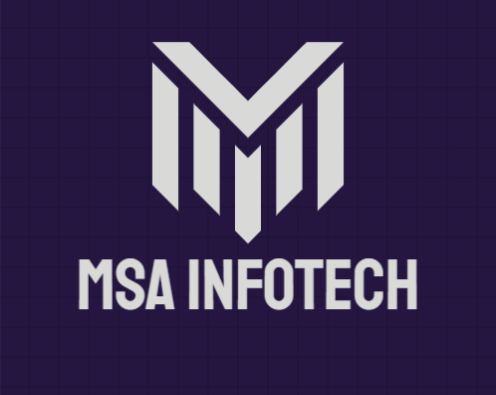Exception Handling in C#
- Data Engineering
- November 05, 2024
-
Exception Handling in C#
Introduction:
Exception handling is a fundamental concept in software development, crucial for building robust and reliable applications. In the world of C# programming, understanding and mastering exception handling techniques is essential for writing code that can gracefully handle runtime errors and exceptional conditions. In this blog post, we will explore exception handling in C#, covering its methods, advantages, disadvantages, best practices, and its examples.
Understanding Exception Handling in C#:
Exception handling in C# provides a structured mechanism to detect, report, and handle runtime errors and exceptional conditions that may occur during program execution. When an error occurs, C# throws an exception object, which encapsulates information about the error, such as its type, message, and stack trace. Developers can catch and handle these exceptions using various constructs provided by the language, preventing application crashes and ensuring program stability.
Methods in Exception Handling:
C# offers several methods and constructs for handling exceptions effectively:
1). try-catch: The try-catch block is the most commonly used construct for handling exceptions in C#. It consists of a try block where the code that may throw exceptions is enclosed and one or more catch blocks that handle specific types of exceptions. Here's an example:
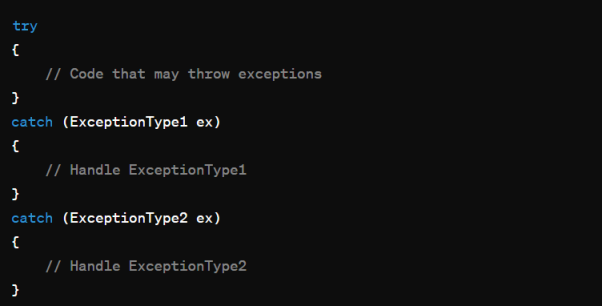
2). try-finally: The try-finally block ensures that a certain block of code is always executed, regardless of whether an exception occurs. It consists of a try block followed by a finally block that contains cleanup code. This construct is useful for releasing resources or performing cleanup operations. Here's an example:
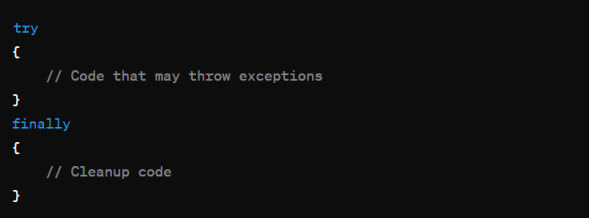
3). try-catch-finally: This construct combines the functionality of try-catch and try-finally, allowing developers to catch exceptions and execute cleanup code in a single construct. Here's an example:
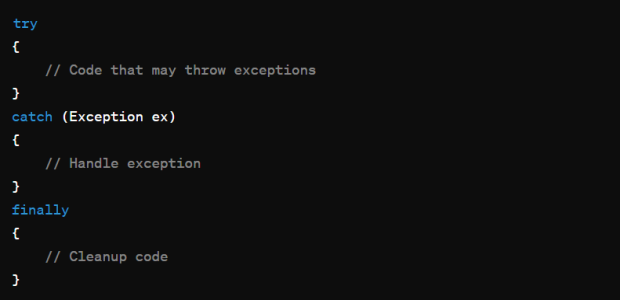
4). throw: The throw statement allows developers to explicitly throw an exception from their code. It is typically used to propagate errors or raise custom exceptions in specific situations. Here's an example:

Advantages of Exception Handling in C#:
Exception handling offers several benefits that contribute to the robustness and reliability of C# applications:
1). Robust Error Handling: Exception handling allows developers to handle runtime errors and exceptional conditions gracefully, preventing application crashes and improving user experience.
2). Separation of Concerns: Exception handling separates error-handling logic from regular program logic, making code easier to understand and maintain. This separation enhances code modularity and readability.
3). Debugging Support: Exception handling provides valuable information about the cause of errors, including stack traces and exception messages. This information aids in debugging and troubleshooting, helping developers identify and fix issues more efficiently.
4). Control Flow: Exception handling provides a structured mechanism for controlling program flow in response to runtime errors. Developers can catch and handle exceptions to take appropriate actions based on the type of exception, enabling graceful error recovery and fallback strategies.
Disadvantages of Exception Handling in C#:
While exception handling offers significant benefits, it also comes with certain drawbacks and considerations:
1). Performance Overhead: Exception handling may introduce performance overhead, especially when exceptions are thrown frequently or in performance-critical code paths. The overhead is incurred during exception processing, including stack unwinding and cleanup operations.
2). Potential for Abuse: Improper use of exception handling, such as catching generic exceptions or swallowing exceptions without proper handling, can lead to code that is difficult to debug and maintain. Overreliance on exceptions as a control flow mechanism may also result in less predictable behavior and increased complexity.
3). Complexity: Exception handling introduces additional complexity to code, especially when dealing with nested ‘try-catch’ blocks or multiple exception types. Managing exception flow and error recovery strategies can be challenging, requiring careful design and consideration of error-handling policies.
Best Practices for Exception Handling in C#:
To ensure effective exception handling in C# applications, developers should follow these best practices:
1). Use Specific Exception Types: Catch specific exception types rather than catching generic Exception objects. This allows for more granular error handling and better error reporting.
2). Handle Exceptions Appropriately: Handle exceptions at the appropriate level of abstraction, considering the context in which they occur. Avoid catching exceptions indiscriminately or ignoring them altogether.
3). Log Exceptions: Always log exceptions when they occur, including relevant information such as the exception type, message, stack trace, and any additional context. Logging exceptions helps with troubleshooting and diagnosing issues in production environments.
4). Use Finally Blocks for Cleanup: Use ‘finally’ blocks to ensure that critical cleanup code, such as releasing resources or closing connections, is always executed. This helps prevent resource leaks and ensures proper resource management.
Example of Exception Handling in C#:
Let's explore a practical example to demonstrate exception handling in C#. Suppose we have a method that performs division operation, and we want to handle the DivideByZeroException gracefully.
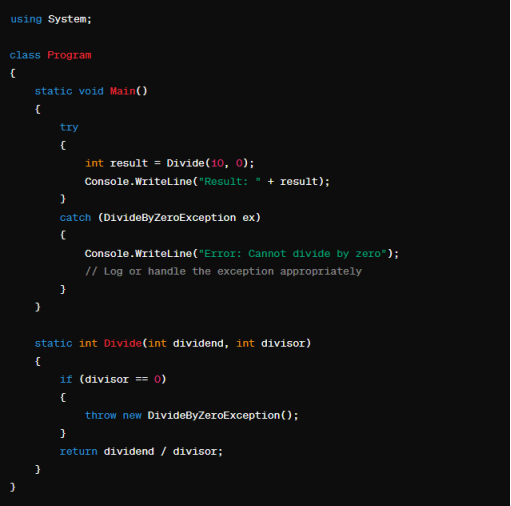
In this example, the ‘Divide’ method performs a division operation, but it checks for the divisor being zero. If the divisor is zero, it explicitly throws a ‘DivideByZeroException’. In the ‘Main’ method, we catch this exception using a ‘try-catch’ block and handle it gracefully by displaying an error message.
ssssssStart Your Data Journey Today With MSAInfotech
Take the first step towards data-led growth by partnering with MSA Infotech. Whether you seek tailored solutions or expert consultation, we are here to help you harness the power of data for your business. Contact us today and let’s embark on this transformative data adventure together. Get a free consultation today!

We utilize data to transform ourselves, our clients, and the world.

Partnership with leading data platforms and certified talents
